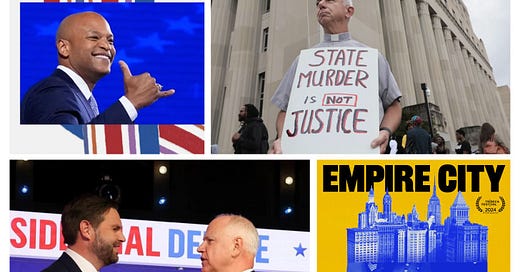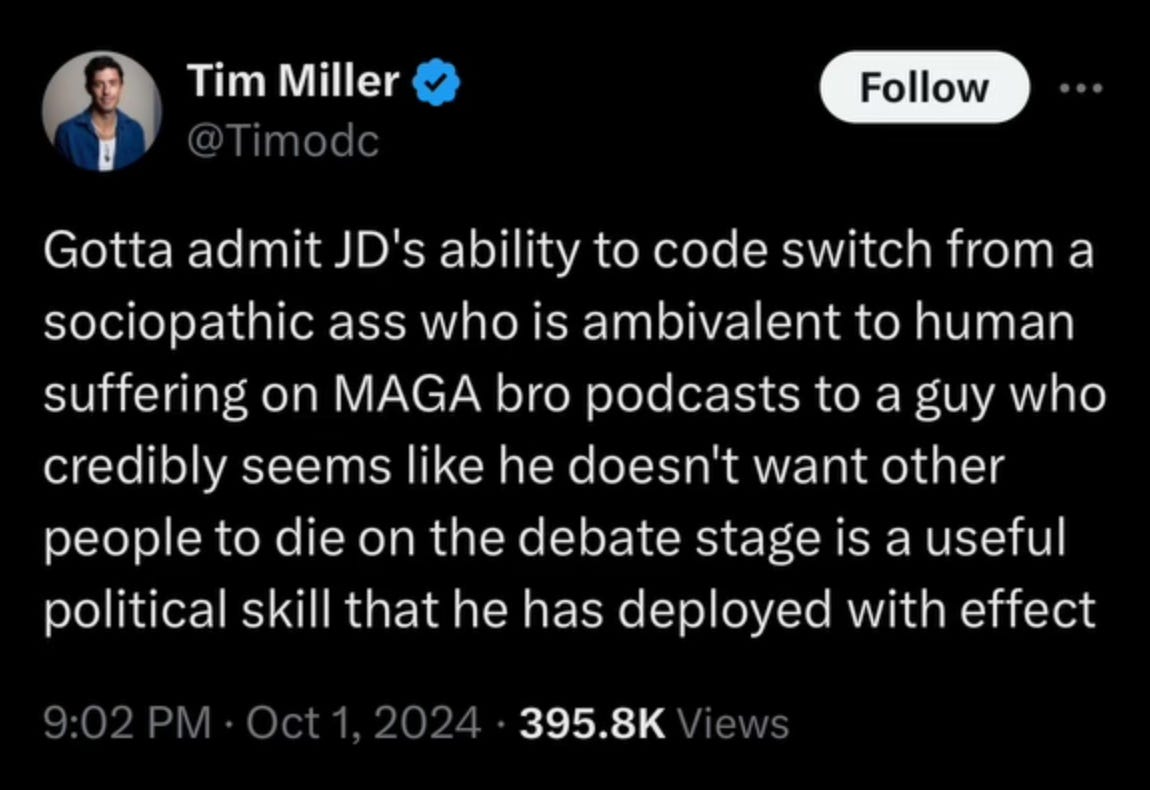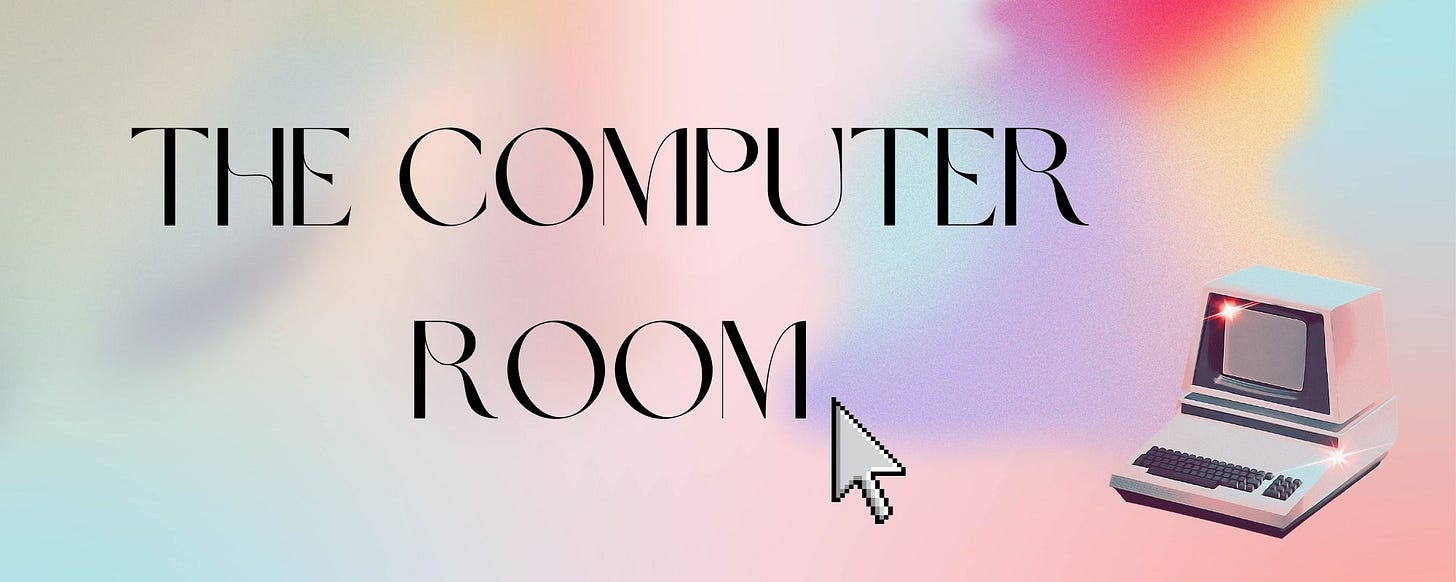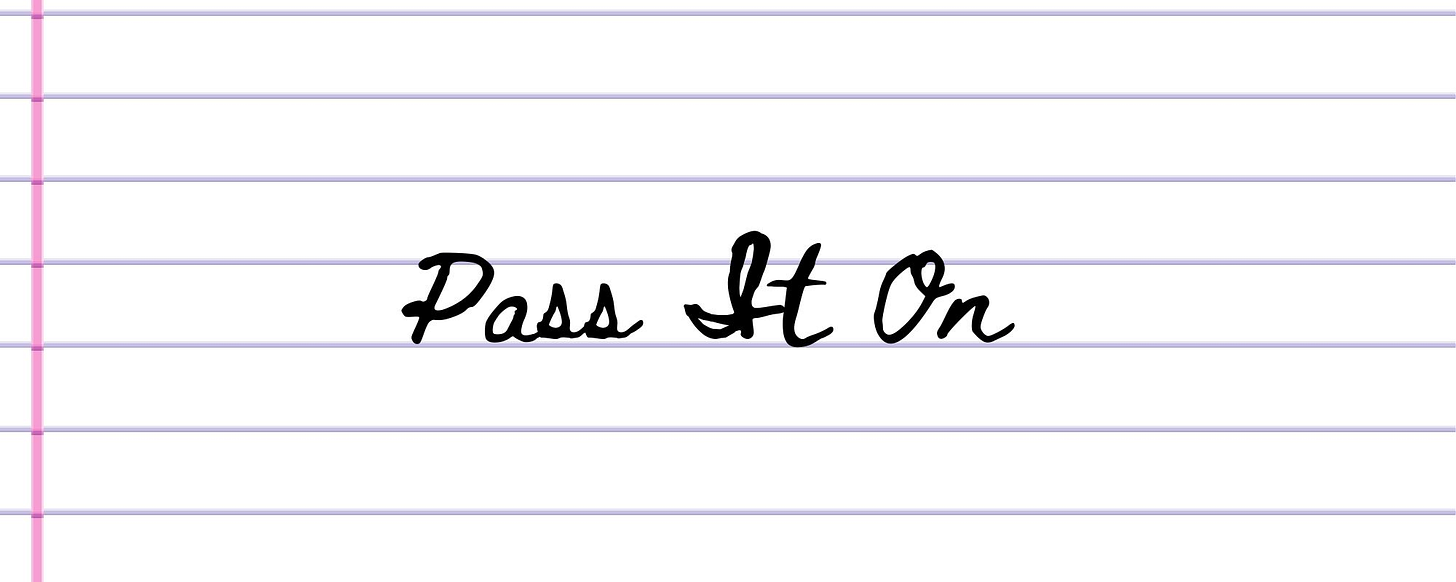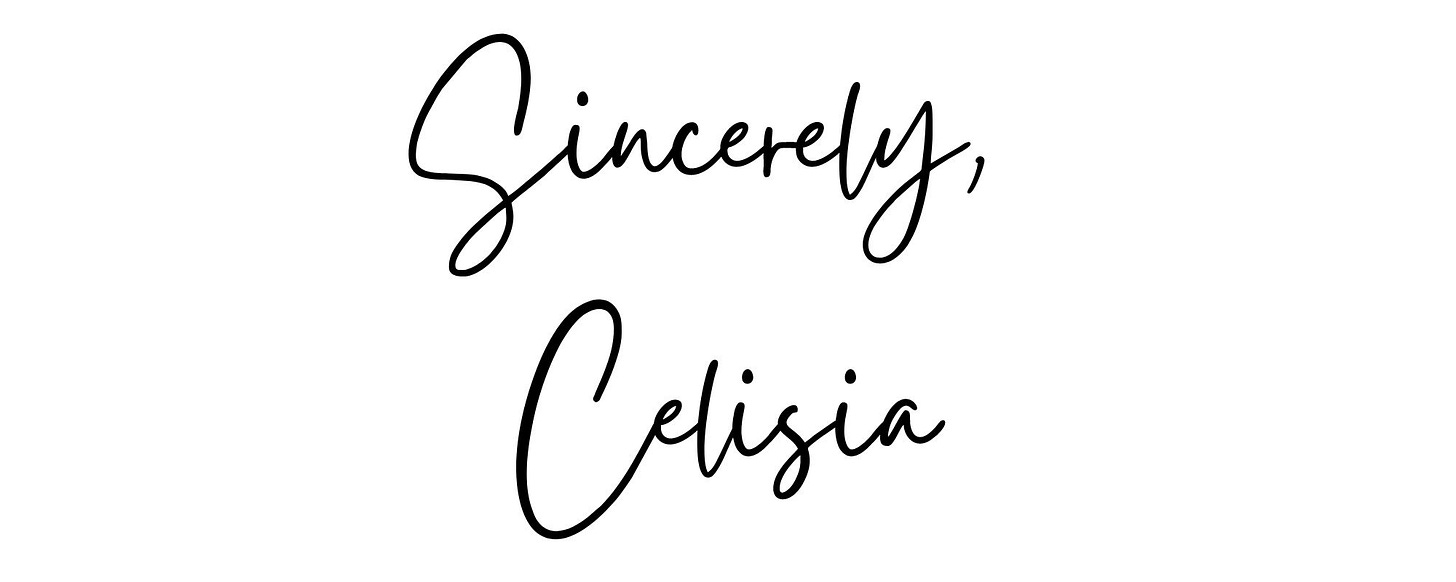Are Democrats the Real Patriots? (Issue #72)
With election day nearing, the Democrats are switching up their strategy.
Hi friends!
At the time of this newsletter’s release, we are just a little over 30 days out from the 2024 U.S. Presidential Election. I watched the V.P. debate on Tuesday, but really only have two things to say:
It seems Vance’s strategy was to out-Walz Tim Walz, and I think it worked. Vance was folksy and uncharacteristically civil, and Walz couldn’t resist the Midwestern urge to respond in kind. While it made for a polite debate (which many seem to appreciate), I personally felt it caused Walz to miss several opportunities to call out J.D.’s bullsh*t.
On that note, my opinion that J.D. Vance has allegiances to no one and is willing to flip-flop his values for personal gain, remains in check. On Tuesday, he cosplayed empathy for Amber Thurman (while promoting policy that literally killed her), gave a phony apology about Gus Walz witnessing a shooting (mere weeks after he’d called school shootings a bleak “fact of life” and rebuffed at the idea of stricter gun laws), and tried to connect with personal stories about childhood poverty (while his ticket has announced zero plans to actually reduce it). This tweet about sums up my feelings on that:
But the VP debate isn’t my focus today. Instead, I wanna talk about patriotism and Black voters.
A few weeks ago, one of my favorite podcasts, The Run-Up, released an episode I’m still thinking about called The Democrats’ Plan to Get Skeptics on Their Side.
In the first half, the episode examines the Democrats’ recent moves to reclaim patriotism. In recent decades, patriotic expression has been closely aligned with conservative ideology and iconography. But now, Democrats are hoping they can make patriotism their brand.
I’ve long felt uncomfortable with the left's view of patriotism as inherently cringey. And like always, there’s lots of nuance there, but I do believe that loving your country and the people in it has the potential to be a radically caring sentiment. It reminds me of a disagreement I had with a friend in 2018 after Trump called Haiti and other African nations “shithole countries.”
“Ironic,” my friend told me. “Ya know, given that this is the shithole country.”
I understood what they were feeling, but something about it didn’t sit right with me. The U.S. is far from perfect, but it’s also the place I’ve called home for my entire life. Everyone I know and love lives here, and everything we’ve built and fought for is here too. Some of the greatest demonstrations of leadership, courage, and resistance I’ve ever seen or learned about have happened here. Organizers and activists I admire have struggled and persevered all in the name of securing a safer and more equitable future for the people living here.
Of course, it reminds me of that oft-referenced James Baldwin quote:
“I love America more than any other country in the world and, exactly for this reason, I insist on the right to criticize her perpetually.”
The Run-Up’s deep dive into patriotism features an interview with Wes Moore, Maryland’s first-ever Black governor. In it, he shares the story of his maternal grandfather, a child of Jamaican immigrants, who fled the U.S. due to the violence of the Ku Klux Klan. While many of Governor Moore’s relatives never returned, his grandfather did. He believed in America, and as Moore tells it, his grandfather felt the country would be “incomplete without him.”
In Moore’s words:
“My grandfather had a deep Jamaican accent his entire life. And he was maybe the most patriotic American I’ve ever met. And I always found myself not just with a love and an admiration for his level of patriotism, but also with a deep respect of this country’s history, of this country’s journey, of the incompleteness of the United States, and of this American promise, yet, at the same time, feeling like I had a distinct responsibility to be able to help to heal it.”
It reminded me of my own grandfather, who immigrated to the United States from Roatán. He’s been here since the ’60s and has, too, never lost his thick Caribbean accent. And still, he sees himself as part of what makes this country what it is. That’s what I’m defensive of – the diversity of experiences and commitment from people of all different backgrounds, building lives they feel proud of in a country they love (even if she doesn’t always love them back).
And this patriotism? It’s something the Democrats can and should use, especially when it comes to engaging undecided Black voters. Which brings me to the second half of the episode, which featured Prentiss Haney, an Ohio-based political organizer and the strategic advisor with the Democracy Power and Innovation Fund. If you’ve been following the election closely, you’ve probably heard a lot about “the Black vote.” Alongside the assumption the Black vote will solidly swing blue arises a newly common narrative about Black men “defecting” to Donald Trump. And there’s been some evidence to support this. A recent NAACP poll found that one in four Black men under 50 support Trump. But Haney has been working directly with Black voters for over 14 years, and he says the truth is much more complicated.
To highlight the nuances and differences in motivation amongst the Black electorate, Haney broke this voting block into five types based on a recent national survey of Black voter groups:
Legacy Civil Rights - These are older Black voters who likely lived through and participated in the Civil Rights Movement. They make up about 40 percent of the Black electorate and are always going to show up and vote. They have a strong investment in democracy and are typically profoundly committed to their faith and the church.
Secular Progressives - This is the group that I most likely fall into. These voters are invested in progressive candidates and are more secular than the Legacy Civil Rights voters. They have critiques of the system but still view their vote as powerful.
Race-neutral Conservatives - These voters are conservative in their ideology and do not see race as a primary factor or driver in American politics.
Next Gen Traditionalists - These voters, who tend to be younger, are guided by their faith and a commitment to more traditional values. They have a strong Black identity and are invested in learning about all candidates so that they can make decisions they feel are best for their families. Haney said they’re often viewed as conservative, but they’re actually more moderate. These voters will likely show up to the polls, they’re just still trying to decide who they will vote for.
Rightfully Cynical Voters - These voters feel they’ve been failed by institutions over and over again. They feel failed by both Republicans and Democrats, but also by the church, judicial system, schools, and more. They’re motivated by economic security, and are naturally distrustful of institutions trying to tell them how to act. These voters aren’t just concerned with who they will vote for. In fact, they’re trying to decide if they will vote at all.
In the episode, Haney points out that the last two of these groups (Next Gen Traditionalists and Rightfully Cynical Voters) make up about 40 percent of the Black electorate, and yet they’re the most ignored during the election cycle. These are the voters who are grouped together as the Black men “defecting” from the Democratic Party and rallying behind Trump. However, there are key differences between the two groups, and acknowledging these differences and their unique motivations might actually be the secret to winning their vote.
Hearing Black voting behaviors broken down in this way, I saw my own experiences reflected back. It emphasized that even within a group with shared histories, there is still so much diversity. The news often talks about Black voters as a monolith, a group the Democrats have on-lock. And while Black voters’ longstanding allegiance to the democratic party can’t be ignored, perhaps we’re in a new era of American politics, one which will require the Democrats to get more specific. To appeal to the real people heading to the ballot box. And for the sake of our democracy, it’s something I hope the Harris campaign can figure out.
A round-up of things to watch, read, and listen to as you head into the weekend.
I know how frustrating paywalls are! When possible, I’ll try to offer gift links through my subscriptions to support access to high-quality journalism.
AP: Missouri executes a man for the 1998 killing of a woman despite her family’s calls to spare his life by David A. Lieb and Jim Salter
Last week, five death row inmates were killed – the most in decades. One of these was the execution of Marcellus Williams, a 55-year-old man sentenced to death for the 1998 stabbing of Lisha Gayle. Right up to the moment of his death, people across the country (including Gayle’s family and the prosecutor) begged Missouri to spare Williams’ life. Marcellus was all over my feeds last week, but I think it’s important that people know the story behind the social media graphics that have been circulating. This article is a great primer.
The New York Times: In a First Among Christians, Young Men Are More Religious Than Young Women (gift link) by Ruth Graham
As more and more young women leave the church, the political landscape is also changing along gender lines. In fact, Gen Z-ers are experiencing the biggest political gender divide of any generation, and this article is a great primer on how religion (or the lack thereof) might play a role.
Podcast: Empire City
Examining the untold origin story of the NYPD, this podcast is a fascinating exploration into a history of corruption and resistance. I was listening last week and was *thrilled* when I discovered that activist and abolitionist Mariame Kaba was interviewed!!
Things to try + share in the group chat.
Note: Links preceded by an asterisk (*) are affiliate links that allow me to collect a small commission when you purchase something I’ve recommended. That said, I can promise I’ll only ever share items I love. Buying through these links is one way to support me and my small biz. ❤️
If you (like me) are looking for the perfect fall read, I hiiiighly recommend perusing The Fall Books Issue from
. The list is broken down by genre and includes picks from a bunch of guest authors, writers, and readers, each recommending two of their favorite fall reads!
*These to-do list keychains are probably targeted at kids, but I think they could really have a lot of uses for people of all ages! I love the idea of using it to guide important reminders of things to do before leaving the house, but I could see it also being helpful for work to-dos, cleaning tasks, etc!
Have a great weekend!
Want to stay connected between now and next Friday? Don’t be a stranger!! Make sure to follow me on Instagram and TikTok. Know someone who you think would like Sincerely, Celisia? It would mean the world if you could help spread the word by sharing this newsletter through the button below!! <3

